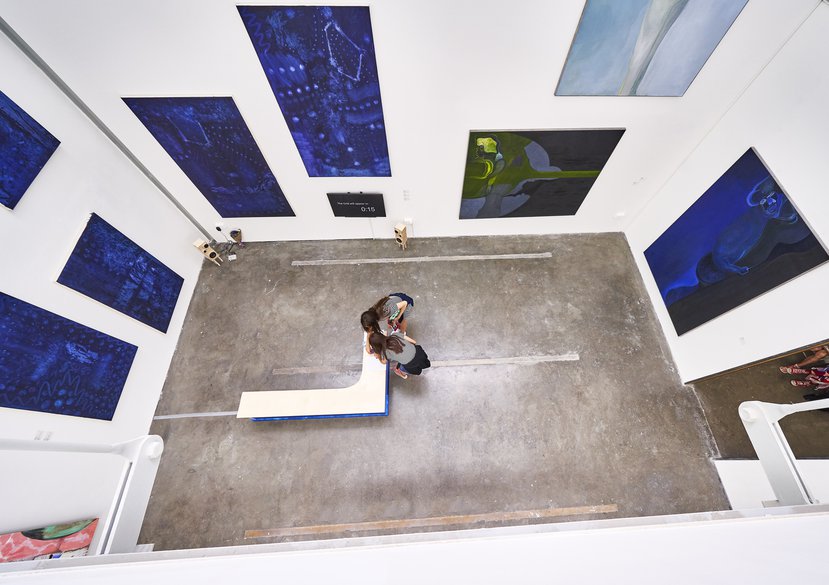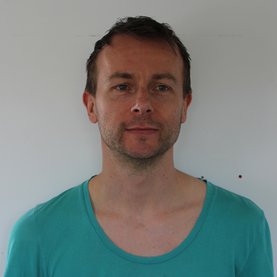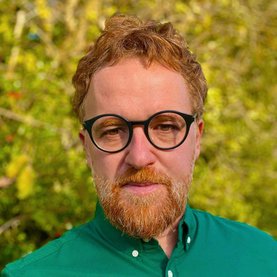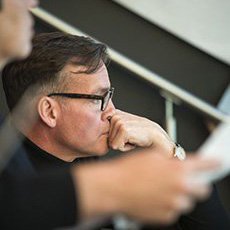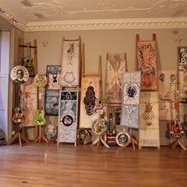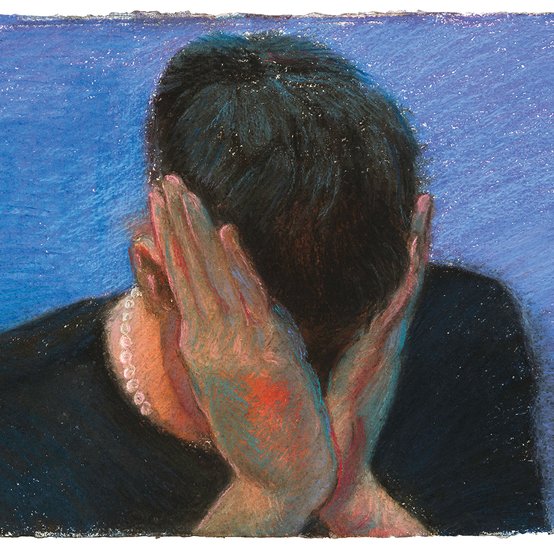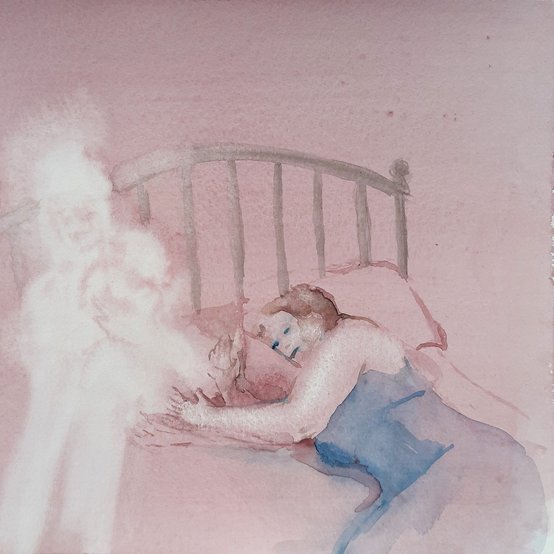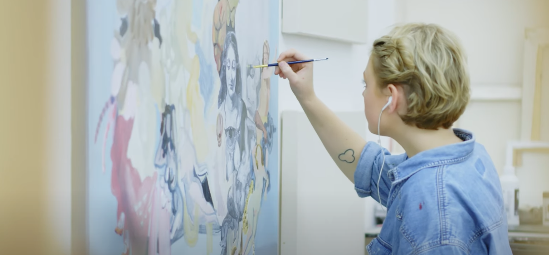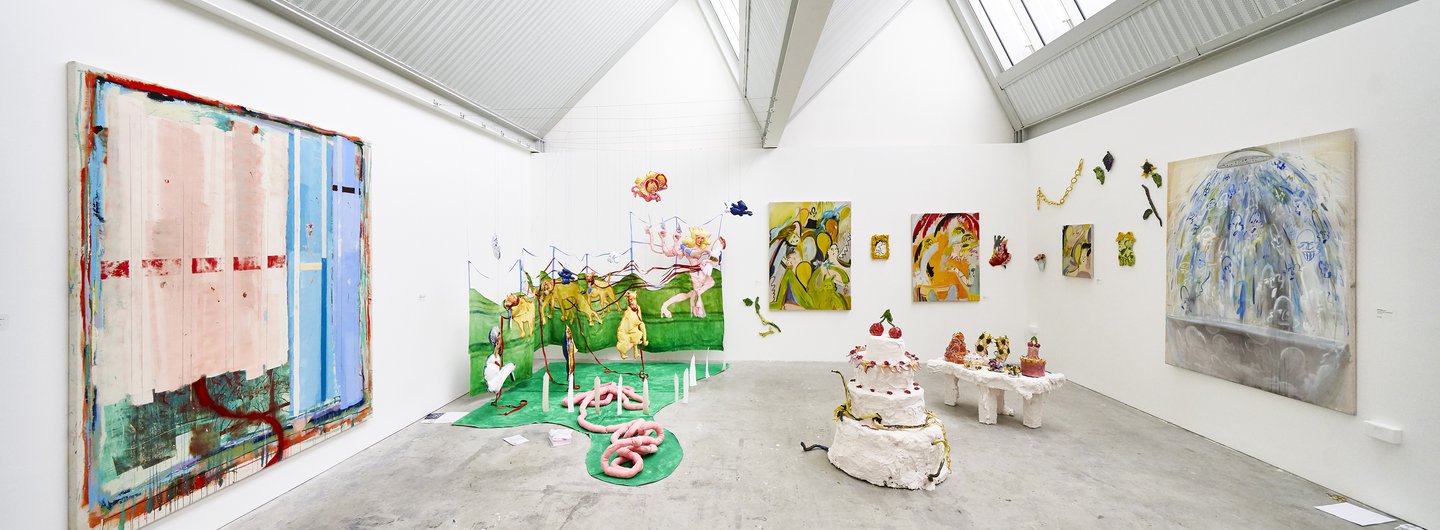
Overview
Expansive and inclusive
Key details
- 180 credits
- 1 year programme
- Full-time study
School or Centre
Location
- Battersea
Next open event
Application deadline
- 14 Aug 2024
Committed to broadening the understanding of painting
Join an internationally renowned studio-based Master’s programme with a reputation for producing artists working at the forefront of the discipline.
Our innovative teaching approach fosters creative, self-reflective and critical artists. We cultivate these values through shared practices, research, and a collaborative culture engaging with current global issues. You’ll embrace painting’s rich material and conceptual history and its potential in the 21st century.
You’ll have opportunities to understand and advance your studio practice through individual tutorials and group critiques, online group seminars, workshops, artist talks and presentations. You'll hone your ability to reflect critically on your studio work, informed by the perspectives of your peers, faculty, and invited contributors.
Our teaching staff comprises accomplished artists of international standing who work across a diverse range of media. We’ll support you in finding the right technical skills needed to communicate your ideas. We respect technical skills while emphasising clear concepts and images.
We are committed to supporting your artistic and professional practice, enabling you to forge a sustainable and engaged career in the creative economy.
Applications for the September 2024 intake are open and will be assessed on a rolling basis. Programmes will close for applications when the maximum number of places have been awarded, or at the final deadline on 14 August, 12 noon (UK time).
Explore graduate work
In July 2023, students presented RCA2023, a series of exhibitions and events. Explore online at https://2023.rca.ac.uk/
You can also view previous events and exhibitions online at Showcase.
Find out more about this programme
Catch the replays from our latest online Open Day.
Gallery
Staff
Facilities
The School of Arts & Humanities is located across our Battersea and Kensington sites.
View all facilitiesAll full-time students on fine or applied arts programmes are provided with studios or workspace, and access to specialist workshops. There are a number of bookable seminar and project spaces across the site available to all Arts & Humanities students.
Our alumni
Our alumni form an international network of creative individuals who have shaped and continue to shape the world. Click on each name to find out more.
Where will the RCA take you?More details on what you'll study.
Find out what you'll cover in this programme.
What you'll cover
How will I learn?
There will be several opportunities to collaborate with others, but at a minimum, your programme will include 248 contact hours and 1552 independent study hours. Contact hours can consist of lectures, seminars, tutorials, critical forums and workshops, among other types of teaching delivery.
Teaching types included in your programme can consist of briefings, projects, tutorials, seminars, lectures, critical forums, technical inductions, technical workshops, offsite visits and blended learning.
Programme structure
The programme is delivered across three terms and includes a combination of programme, School and College units.
Term 1
In Establishing a Painting Practice (45 credits), you will understand what informs the content, subject matter, form and execution of your work, as well as establish the audio, visual and material research that feeds your work and practice. This unit will begin with a series of technical inductions, artist lectures and seminars presented by the Painting faculty to help you establish and orient your practice within the broader painting field. Establishing a Painting Practice supports you as you produce work, locate their work within a critical context while reflecting on historical and contemporary approaches to painting, ultimately leading to the development of an innovative individual practice. Additionally, you achieve this through curricular content through seminars, workshops, individual tutorials, group critiques and off-site visits.
Term 2
In Painting in the Expanded Field: Experimental Positions (30 credits), you further examine and challenge the conceptual, aesthetic and material approaches to making that they developed in Unit 1. The goal of this unit is to encourage you to deepen your understanding of the future direction of your practice with an interdisciplinary focus on experimentation, execution and critical reflection. You will produce finished work at an advanced level and explore various modes of presenting. The end of this unit will culminate in a presentation and a written proposal for your IRP in preparation for the degree show presentation of your work in unit 3.
In the School-wide unit Urgency of the Arts (15 credits), we ask how arts and humanities research and practice can engage with our current socio-political climate and how might it shape, be necessary and essential in contemporary cultural debates.
The unit introduces students to diverse perspectives, approaches, and methods relevant to contemporary practice and thought in the arts and humanities. The delivery, predominantly based on workshops and featuring specialist presentations by leading artists aims to assist students in recognising, questioning, expanding, and reevaluating their own artistic practices and disciplinary assumptions. Through interactions with staff and students from across the School, as well as through a variety of methodological approaches, students will develop an understanding of the contemporary concerns that shape and influence artistic practice.
Students will be supported in understanding their work's possibilities, complexities and impact. They will be encouraged to contextualise it within broad cultural landscapes to recognise and emphasise its potential and the complex ways their work may be received and understood.
Term 3
The Independent Research Project (60 credits) is an opportunity to build a body of work that addresses the key ambitions of your research and practice. You will work towards presenting a work or works in the IRP Public Exhibition, which enables you to explore how to activate your work in a public context, experiment with the most appropriate forms of realising your ideas and gain critical feedback. The IRP exhibition takes place mid-way through the unit. It will be followed by a reflection and further development period, which emphasises planning for continued practice and research post-graduation.
The programme approaches the Independent Research Project as a self-directed study centred on an assessed presentation of your work as an exhibition, a publication and a research essay.
AcrossRCA
AcrossRCA is a compulsory 30-credit unit which is delivered as part of all MA programmes.
Situated at the core of your RCA experience, this ambitious interdisciplinary College-wide unit supports you in responding to the challenges of complex, uncertain and changing physical and digital worlds. Developed in response to student feedback, AcrossRCA creates an exciting opportunity for you to collaborate meaningfully across programmes.
Challenging you to use your imagination and intellect to respond to urgent contemporary themes, this ambitious unit will provide you with the opportunity to:
- make connections across disciplines
- think critically about your creative practice
- develop creative networks within and beyond the College
- generate innovative responses to complex problems
- reflect on how to propose ideas for positive change in local and/or global contexts
AcrossRCA launches with a series of presentations and panel discussions from acclaimed speakers who will introduce the themes and act as inspirational starting points for your collaborative team response.
Delivered online and in-person across two terms, the unit has been designed to complement your disciplinary studies and to provide you with a platform to thrive beyond graduation.
Requirements
What you need to know before you apply
Candidates are selected entirely on merit and applications are welcomed from all over the world. The selection process will consider creativity, imagination and innovation as demonstrated in your portfolio, as well as your potential to benefit from the programme and to achieve high MA standards overall.
The application procedure focuses on searching out those candidates that are highly motivated, independent and demonstrate they have the critical skills necessary to develop and further their existing ideas. In short, those artists that – given the opportunity to join the Painting programme – would utilise their time with us to the full, and have the generosity to support their fellow students.
We welcome candidates from all kinds of backgrounds, but generally having completed a BA degree. In recent years, people have come from fine art, printmaking, painting, sculpture, photo media, conservation, illustration, design, textiles, architecture, art history and interactive arts courses.
While many students enter the course after years of independent work, we also accept students directly from undergraduate courses.
Ultimately, we want to attract to the course those artists that want to work in a supportive environment and have the drive and ambition to realise the full potential of their studio practice, in turn energising their peer group.
What's needed from you
Portfolio requirements
The Painting programme offers an inclusive platform on which to engage with current issues and debates surrounding the location of painting as a vibrant part of contemporary art practice. Our curriculum is designed to develop your professional practice, orientation towards research and critical reflection on your studio work and how you present that work and your practice professionally to others.
In this portfolio, please submit documentation of the work you make as a PDF. Be sure to include the title, date, size and material make-up (media used) of each work.
You have one slot which can accept one PDF.
Your PDF should include at least 10–15 images of work and should be a maximum of 15 pages total. Each page may show how a work developed and evolved from start to completion in addition to showing completed or finished work.
We want to learn about:
- How you approach the conception and making of your paintings?
- How you position your painting in a contemporary context?
- What are the issues, concerns and themes you explore in your painting?
Video requirements
We ask that you upload a two-minute video recorded on your phone or laptop, speaking to us directly. High production qualities are not needed. We will review the work in your portfolio, so keep your video simple.
The Painting programme approaches painting as a self-reflexive, critical activity that draws on a wealth of varied historical, material and conceptual positions and accomplishments. The programme is committed to broadening the understanding of our discipline in all its forms. Our students are here to reflect upon and play out what kind of artists they want to be with the ultimate aim of enabling a sustainable professional practice as engaged practitioners.
In this two-minute video, please respond to the above statements and elaborate on the questions previously asked about your work and practice as documented in your portfolio.
We particularly want to learn:
- How are you beginning to define your work and painting practice?
- What feeds your practice and informs the choices you make in content, subject matter, form and execution?
- What types of visual, audio or material research feeds your work and practice?
English-language requirements
If you are not a national of a majority English-speaking country you will need the equivalent of an IELTS Academic or UKVI score of 6.5 with a 6.0 in the Test of Written English (TWE) and at least 5.5 in other skills. Students achieving a grade of at least 6.0, with a grade of 5.5 in the Test of Written English, may be eligible to take the College’s English for Academic Purposes course to enable them to reach the required standard.
You are exempt from this requirement if you have received a 2.1 degree or above from a university in a majority English-speaking nation within the last two years.
If you need a Student Visa to study at the RCA, you will also need to meet the Home Office’s minimum requirements for entry clearance.
Fees & funding
For this programme
Fees for new students
Fees for September 2024 entry on this programme are outlined below. From 2021 onward, EU students are classified as Overseas for tuition fee purposes.
Home
Overseas and EU
Deposit
New entrants to the College will be required to pay a non-refundable deposit in order to secure their place. This will be offset against the tuition fees.
Home
Overseas and EU
Progression discount
For alumni and students who have completed an RCA Graduate Diploma and progress onto an RCA Master's programme – MA, MA/MSc, MFA, MDes, MArch, MEd or MRes – within 10 years, a progression discount of £1,000 is available.
* Total cost is based on the assumption that the programme is completed in the timeframe stated in the programme details. Additional study time may incur additional charges.
Scholarships
Scholarships
Scholarships are awarded for a specific programme and entry point and cannot be deferred without consent from the academic Programme and scholarships panel.
The Deputy Vice-Chancellor’s International Scholarship
For: All MA programmes, MArch, MFA, MDes, MRes & MEd
Eligibility criteria: Students from Australia, Bangladesh, Canada, Colombia, Cyprus, Egypt, France, Germany, Greece, Hong Kong, India, Indonesia, Ireland, Israel, Italy, Japan, Lebanon, Malaysia, Mexico, Nigeria, Pakistan, Poland, Portugal, Saudi Arabia, Singapore, South Korea, Spain, Sri Lanka, Switzerland, Taiwan, Thailand, Turkey, UAE, USA
Eligible fee status: Overseas fee status
Value: £7,000 towards fees
The Deputy Vice Chancellor’s EU Scholarship
For: All MA programmes, MArch, MFA, MDes, MRes & MEd
Eligibility criteria: Students from Austria, Belgium, Bulgaria, Croatia, Cyprus, Czech Republic, Denmark, Estonia, Finland, France, Germany, Greece, Hungary, Iceland, Italy, Latvia, Liechtenstein, Lithuania, Luxembourg, Malta, Netherlands, Norway, Poland, Portugal, Romania, Slovakia, Slovenia, Spain, Sweden, Switzerland, Turkey
Eligible fee status: Overseas fee status
Value: £7,000 towards fees
The Ali H. Alkazzi Scholarship Award
For: MA Painting
Eligibility criteria: Students from China, France, Monaco, Portugal, Spain
Value: Full fees & maintenance
The Deputy Vice-Chancellor’s UK Scholarship
For: All MA programmes, MArch, MFA, MDes, MRes & MEd
Eligible fee status: Home fee status
Value: £5,000 towards fees
Leverhulme Arts Scholarship
For: MA Sculpture, MA Painting, MA Contemporary Art Practice, MA Print, MA Photography
Eligible fee status: Home fee status
Value: Full fees
The RCA UK Disabled Students’ Scholarship
For: All MA programmes, MArch, MFA, MDes, MRes & MEd
Eligibility criteria: Students who identify as D/deaf or disabled
Eligible fee status: Home fee status
Value: £6,000 for living costs
Sir Frank Bowling Scholarship
For: All programmes excluding PhD & short courses
Eligibility criteria: Black or Black British Caribbean, Black or Black British African, Other Black Background, Mixed - White and Black Caribbean, Mixed - White and Black African
Eligible fee status: Home fee status
Value: Full fees & maintenance
The Vice-Chancellor’s UK Cost of Living Scholarship
For: All MA programmes, MArch, MFA, MDes, MRes & MEd
Eligible fee status: Home fee status
Value: £5,000 for living costs
House of Fraser Bursary
For: Any MA programme
Eligible fee status: Home fee status
Value: £10,000 towards fees
Radcliffe Trust Craft Scholarship
For: MA Painting, MA Sculpture, MA Jewellery & Metal, MA Ceramics & Glass
Eligible fee status: Home
Value: £9,000 Tuition Fee Discount
Lucy Halford Bursary
For: MA Painting
Eligible fee status: Students from the EU with Overseas fee status
Value: Full fees
The Paul Desty Scholarship
For: MA Painting
Eligible fee status: Home
Value: Full fees
Rose Finn-Kelcey Bursary
For: MA Sculpture, MA Painting, MA Contemporary Art Practice, MA Print and MA Photography
Eligible fee status: Home & Overseas
Value: £10,000
Applying for a scholarship
You must hold an offer to study on an RCA programme in order to make a scholarship application in Spring 2024. A selection of RCA merit scholarships will also be awarded with programme offers.
We strongly recommend that you apply for your programme as early as possible to stand the best chance of receiving a scholarship. You do not apply directly for individual awards; instead, you will be invited to apply once you have received an offer.
More information
Additional fees
In addition to your programme fees, please be aware that you may incur other additional costs associated with your study during your time at RCA. Additional costs can include purchases and services (without limitation): costs related to the purchase of books, paints, textiles, wood, metal, plastics and/or other materials in connection with your programme, services related to the use of printing and photocopying, lasercutting, 3D printing and CNC. Costs related to attending compulsory field trips, joining student and sport societies, and your Convocation (graduation) ceremony.
If you wish to find out more about what type of additional costs you may incur while studying on your programme, please contact the Head of your Programme to discuss or ask at an online or in person Open Day.
We provide the RCASHOP online, and at our Kensington and Battersea Campuses – this is open to students and staff of the Royal College of Art only to provide paid for materials to support your studies.
We also provide support to our students who require financial assistance whilst studying, including a dedicated Materials Fund.
External funding
There are many funding sources, with some students securing scholarships and others saving money from working. It is impossible to list all the potential funding sources; however, the following information could be useful.
Payments
Tuition fees are due on the first day of the academic year and students are sent an invoice prior to beginning their studies. Payments can be made in advance, on registration or in two instalments.
Start your application
Change your life and be here in 2024. Applications now open.
The Royal College of Art welcomes applicants from all over the world.
Before you begin
Make sure you've read and understood the entrance requirements
Visit the requirements pageCheck you have all the information you need to apply.
Read our application process guideConsider attending an Open Day, or one of our portfolio or application advice sessions
See upcoming sessionsPlease note, all applications must be submitted by 12 noon on the given deadline.
Ask a question
Get in touch if you’d like to find out more or have any questions.

